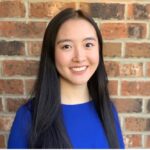By Jacqueline Gu
Anne Feng (’18) fondly remembers reading illness narratives as a student in LMC classes because they helped her realize the type of care she wants to provide as a physician. Anne, now a fourth-year medical student at Harvard Medical School, is working towards becoming an ENT surgeon. She is passionate about ENT because of its continuity of care within an illness episode. Unlike other surgery subspecialities, where surgeons are present for only the procedure itself, ENT surgeons are able to oversee the patients through their entire treatment.
Anne vividly remembers taking courses as member of the HHIVE Lab, where she studied medicine through a critical anthropology lens. During her time as an undergraduate student, even when she felt like an outside audience member, peering into the stage of the clinic, she still deeply identified with the doctors. When she finally entered the medical profession, she began to realize how special her HHIVE experiences were, especially in training her to effectively communicate with others.
Interacting with a diverse group of people with different academic interests in the HHIVE Lab allowed Anne to become comfortable conversing with people. Anne describes how her courses and time in the lab taught her invaluable communication and writing skills. She points out that “learning to read and write really well is just a necessary skill no matter what you do”. Whether it be with fellow scholars, or with patients in the clinic, communication is one of the most important skills she could have. Her experiences at HHIVE taught her not just a different mode of inquiry, but also just how to “craft a really good paragraph”, something that she says will no doubt help in all aspects of her career. Because of the comparative perspectives that she gained through her experience, Anne also says that she has gotten better at finding analogies, something she uses to not only communicate with her patients, but also with her peers and other academics. Understanding the importance of language allows her to talk about uncomfortable things with her patients in a way that normalizes their experience, something that Anne really values.
Anne also learned how to hold dualities through her experience in the HHIVE Lab and LMC coursework. While it is extremely important to give each and every one of her patients the same quality care, Anne also understands that it is also important to validate her own tiredness during the eleventh hour of her twelve-hour shifts. Thus, allowing her to be a physician that is ultimately someone that champions the needs of the patient.
In addition, Anne describes how reading, whether it be formally inside the classroom or in her own personal life, helped her “see behind the green curtain.” Reading allowed Anne to transport herself to different worlds, perspectives, and experiences, and helped her glean life experience through immersing herself in various narratives. Being one of the youngest students in her cohort, Anne was hyper aware of how her age could have impacted her skills in the clinic. But reading allowed her to gain life experience through stories, which helps her better connect with her patients.
Anne is hopeful and excited about finally becoming a surgeon, something that she has been working towards for a long time. She will also begin multiple clinical research projects, including studying the economic cost of thyroid disease, completing a systematic review of treatments of benign nodules, conducting a hearing test project, and so much more. In the long term, Anne is interested in studying ways to predict or reduce surgical intervention in the long term. With a smile, Anne states how “no one wants to be in the OR”, despite how eager surgeons may be to operate. We here at HHIVE are so proud of Anne for her accomplishments so far and cannot wait to see the amazing projects she has lined up come to fruition!
Anne will return to HHIVE in March 2022 for an Alumni Career Panel. Subscribe to the HHIVE List at go.unc.edu/HHGRList to receive information about registration.
 Jacqueline Gu is a senior at UNC studying Quantitative Biology, ECL, and Medical Anthropology. Her interest in the health humanities is motivated by her family’s experiences within the healthcare system and her volunteer work within the Asian American community. Namely, she is interested in how sociocultural factors shape what it means to be truly “healthy”. While at UNC, she co-founded and serves as the co-president for the Asian Health Advocacy Alliance with a mission to improve the overall health of AAPI in NC through advocacy, education, and community engagement. She also serves as the Mandarin Director for the Student Health Action Coalition.
Jacqueline Gu is a senior at UNC studying Quantitative Biology, ECL, and Medical Anthropology. Her interest in the health humanities is motivated by her family’s experiences within the healthcare system and her volunteer work within the Asian American community. Namely, she is interested in how sociocultural factors shape what it means to be truly “healthy”. While at UNC, she co-founded and serves as the co-president for the Asian Health Advocacy Alliance with a mission to improve the overall health of AAPI in NC through advocacy, education, and community engagement. She also serves as the Mandarin Director for the Student Health Action Coalition.


